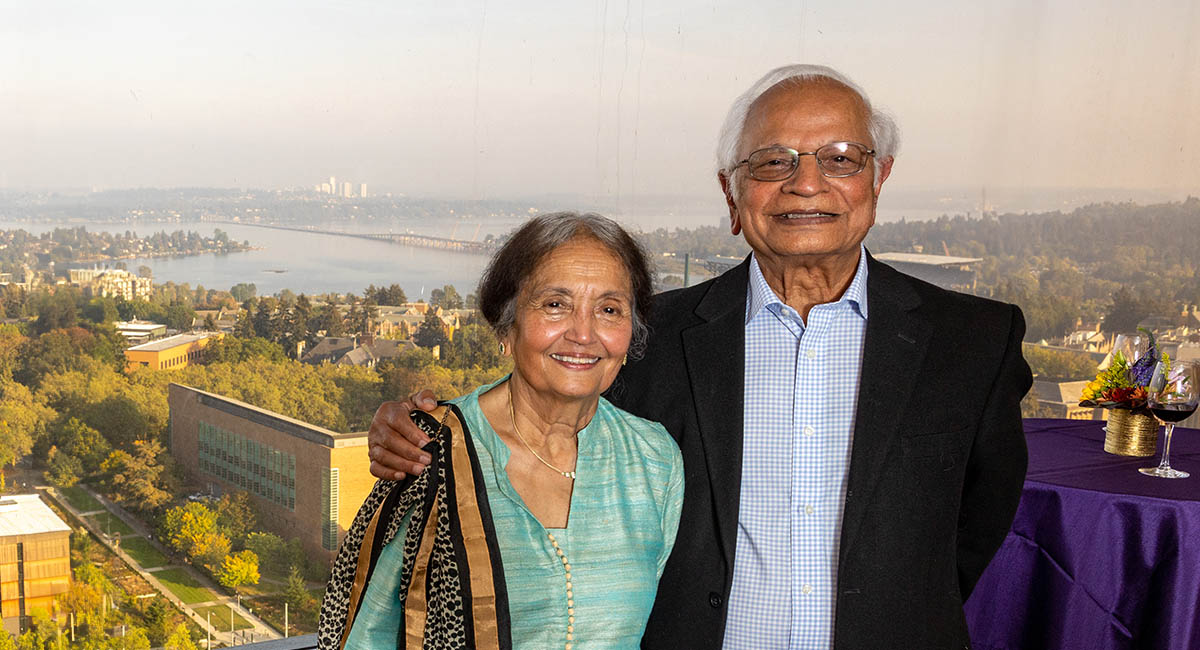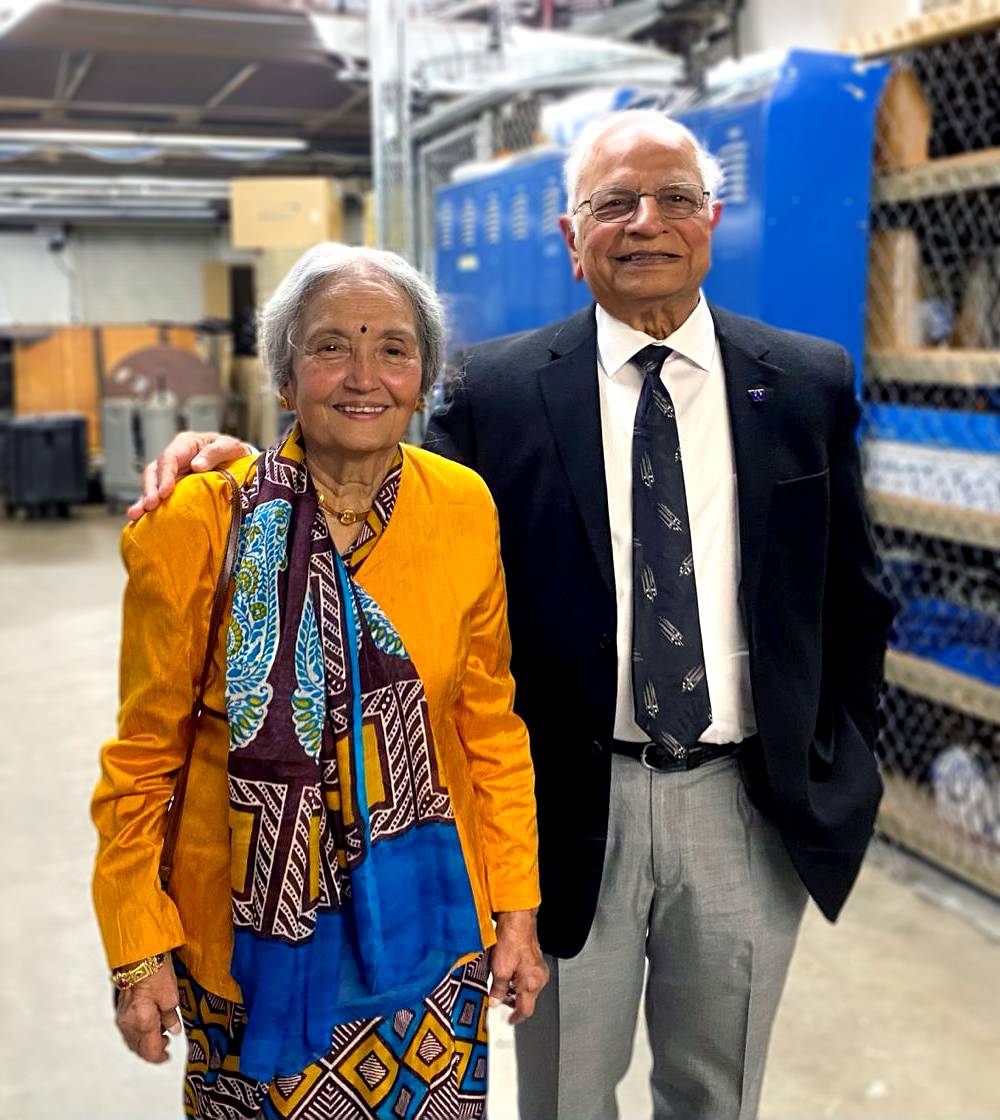
For many people, the concept of research can be mystifying or evoke large, complex processes, but Usha Varanasi encourages thinking about research more simply:
“Research is anything that you search for more than once,” she said. “Research is studying something in a little more detail than in the classroom; it does not have to be esoteric.”
Usha and her husband S. Rao Varanasi have been researchers, scientists, administrators and mentors, spanning the fields of chemistry and engineering and careers in marine ecology and aerospace. Both alumni of the University of Washington (UW), the Varanasis have generously supported student scholars at the UW. Most recently, they have begun supporting the research of undergraduate students, which will now include students in public health.
This past year, they began the inaugural S. Rao and Usha Varanasi Endowed Fund for Undergraduate Student Research in Public Health. The fund will provide broad-based support for highly academically qualified undergraduate students who are actively engaged in research — especially students who are the first-generation in their family to attend college or from underrepresented backgrounds in academia — as well as students who have a demonstrated commitment to diversity, equity and inclusion.
Supporting undergraduate student research is important to the Varanasis because they said it provides hands-on learning opportunities that inspire undergrads to explore unexpected questions or careers.
“We hope that the undergraduates will get their feet wet on real life problems that affect the health of our communities,” Rao said. “The experience gained by the opportunity to embark on such research would keep them attuned to helping the community no matter what profession they land on.”
The School provides opportunities for undergraduate students to engage in research through classes, internships and capstone projects. Every spring, undergraduate public health researchers showcase their work at the SPH Undergraduate Symposium, providing a forum for current students, prospective students, faculty and the community to discuss current topics in public health.
“Hands-on is a much more powerful way of learning because it stays with you much longer than reading books or taking tests,” Usha said.
The Varanasis hope that emphasizing diversity, equity and inclusion in the undergraduate research fund will lead students to ask new and important research questions that can help solve global and local health equity challenges.
“Diversity brings a broader perspective to the table,” Rao said. “If you have a totally homogenous group, it may be easier to get to a consensus solution but the solution from a diverse group is more beneficial to the communities even though it may be harder to reach a consensus.”
“This country is so diverse, it needs to take more advantage of including populations from all different areas to make pursuit of research and knowledge stronger,” Usha added.
The Varanasis have always valued education, having grown up in communities in India where education was celebrated and affordable. After moving to the U.S., Usha and Rao met at California Institute of Technology (Caltech) in 1961 where they were both pursuing graduate degrees: Rao, a master’s in mechanical engineering and Usha, a master’s in chemistry. They were surprised at how costly higher education was in the U.S. and said they would not have been able to do it without the scholarships they received.

They married in Seattle in 1965 and both went on to study at the UW where Rao earned a doctorate in aeronautics and astronautics and Usha a doctorate in organic chemistry.
Rao worked for 45 years at The Boeing Company, focused on research and development in structural engineering, computational mechanics, analytical modeling of engineering systems, and management of military and commercial airplanes. He also served on working groups with the Federal Aviation Administration and the European Aviation Safety Agency and was a member of several executive review teams for the U.S. Air Force. He has been a speaker on safety rules for aircraft design and maintenance around the world.
Usha worked for 35 years at the National Oceanic and Atmospheric Administration's (NOAA) research facility in Seattle, where she applied chemistry to the study of biological systems. She became the first woman science director in NOAA fisheries. Her early research advanced our understanding of how marine mammals process sound and later demonstrated how marine organisms accumulate and process chemical pollutants. Her team was at the forefront of NOAA’s seafood safety response after environmental catastrophes.
Inspired by their own family’s core values of education, as well as their positive experiences at Caltech and UW, the Varanasi’s began to give back to support students.
“When we built our careers, we decided we are in a position to pay back some of these opportunities in the hope that students at the UW would benefit from them,” Rao said. “Young students undertaking research can inspire them to do greater things later in life.”
Currently, Rao serves on the Visiting Committee for the UW Aeronautics and Astronautics Department where he is an affiliate professor. Usha is an affiliate professor in the UW’s chemistry department and School of Aquatic and Fishery Sciences and serves on the steering committee for UW’s Nature and Health program, alongside other UW and SPH faculty. She’s interested in how contact with nature can positively affect mental, physical and emotional health and abate public health crises. Usha is also a member of the Washington State Academy of Sciences and American Association for the Advancement of Science fellow.
The Varanasis also hope that this endowment inspires other donors to give to undergraduate research opportunities.
“Undergraduate research is catching momentum,” Usha said. “Young minds are ready to be opened.”
If you are interested in supporting SPH students through your own personal philanthropy, please contact Katie Bunten, SPH Director for Philanthropy at bunten@uw.edu.